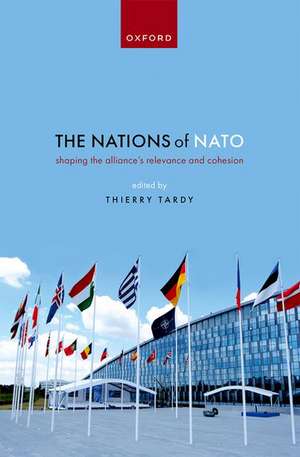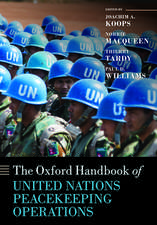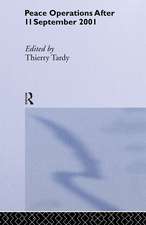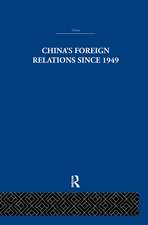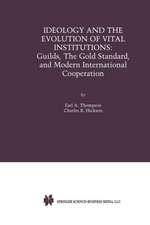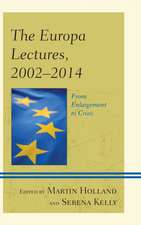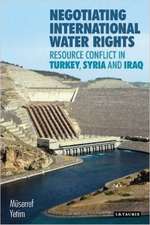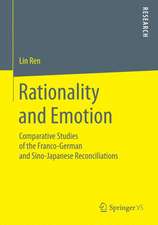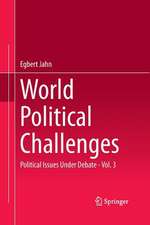The Nations of NATO: Shaping the Alliance's Relevance and Cohesion
Editat de Thierry Tardyen Limba Engleză Hardback – 18 noi 2022
Preț: 583.85 lei
Preț vechi: 834.86 lei
-30% Nou
Puncte Express: 876
Preț estimativ în valută:
111.73€ • 115.43$ • 92.94£
111.73€ • 115.43$ • 92.94£
Carte disponibilă
Livrare economică 15-21 februarie
Preluare comenzi: 021 569.72.76
Specificații
ISBN-13: 9780192855534
ISBN-10: 0192855530
Pagini: 352
Dimensiuni: 161 x 241 x 25 mm
Greutate: 0.69 kg
Editura: OUP OXFORD
Colecția OUP Oxford
Locul publicării:Oxford, United Kingdom
ISBN-10: 0192855530
Pagini: 352
Dimensiuni: 161 x 241 x 25 mm
Greutate: 0.69 kg
Editura: OUP OXFORD
Colecția OUP Oxford
Locul publicării:Oxford, United Kingdom
Recenzii
A welcome collection of essays examining NATO Allies' foreign policies at a pivotal moment in the Alliance's history. The Nations of NATO is a fine example of how the NATO Defense College contributes to relevant academic debates on NATO and is essential reading for scholars and practitioners alike.
In The Nations of NATO, Thierry Tardy has assembled some of the most prominent NATO scholars to deliver incisive analyses on the challenges and opportunities facing NATO Allies and NATO today. This systematic and comprehensive investigation will no doubt be the authoritative reference on NATO's intergovernmental nature. The Nations of NATO brings a new reading on the dynamics of an organisation run by consensus to both academics and practitioners.
Deeply researched and full of fresh insights, The Nations of NATO is a 'must read' for those interested in NATO and its member states' NATO policies. Above all, the contributors' various national backgrounds give this book an unmatched authenticity and diversity. An invaluable addition to our knowledge of NATO.
The Nations of NATO is a cutting-edge work that engages with issues of great contemporary interest. Bringing together the expertise of prestigious scholars from different countries, the book provides a very timely set of analyses of NATO's contemporary functions and challenges. In so doing, it makes an excellent contribution to the literature on NATO and to the field of International Relations as a whole. This will be a must-read for all practitioners, academics, and students interested in world politics.
In The Nations of NATO, Thierry Tardy has assembled some of the most prominent NATO scholars to deliver incisive analyses on the challenges and opportunities facing NATO Allies and NATO today. This systematic and comprehensive investigation will no doubt be the authoritative reference on NATO's intergovernmental nature. The Nations of NATO brings a new reading on the dynamics of an organisation run by consensus to both academics and practitioners.
Deeply researched and full of fresh insights, The Nations of NATO is a 'must read' for those interested in NATO and its member states' NATO policies. Above all, the contributors' various national backgrounds give this book an unmatched authenticity and diversity. An invaluable addition to our knowledge of NATO.
The Nations of NATO is a cutting-edge work that engages with issues of great contemporary interest. Bringing together the expertise of prestigious scholars from different countries, the book provides a very timely set of analyses of NATO's contemporary functions and challenges. In so doing, it makes an excellent contribution to the literature on NATO and to the field of International Relations as a whole. This will be a must-read for all practitioners, academics, and students interested in world politics.
Notă biografică
Thierry Tardy is Director of the Research Division at the NATO Defense College (Rome), and Visiting Professor at the College of Europe (Bruges). He previously held senior research positions at the EU Institute for Security Studies (Paris) and the Geneva Centre for Security Policy. He has published seven books and more than 150 articles and book chapters on issues relating to European security, NATO and EU affairs, UN peacekeeping, and French security policy. He has also taught at the Paris School of International Affairs (Paris), the Sorbonne, the War College (Paris), and the Graduate Institute of International and Development Studies (Geneva).
